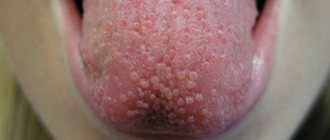Home / Hygiene
Back
Published: 06/14/2020
Reading time: 9 min
0
32
- 1 What to do if the tongue in the throat is swollen - how to treat uvulitis
- 2 Why does my throat hurt after drinking alcohol?
- 3 Main reasons for the development of uvulitis
- 4 Diseases that cause swelling
- 5 Diagnosis of the disease
- 6 How to help in this situation
- 7 How to relieve a sore throat
- 8 What diagnostics will be required?
- 9 Decoctions and infusions for internal use
- 10 Causes of a swollen uvula
- 11 Causes of the disease
- 12 Fiberendoscopy of the nasopharynx
What to do if the tongue in the throat is swollen - how to treat uvulitis
Many people are interested in what to do if the tongue in the throat is swollen. If signs of this pathology appear, the underlying disease that led to its development should be eliminated. Thanks to complex therapy, it is possible to cope with clinical symptoms and normalize a person’s condition.
For uvulitis treatment to be effective, it is very important to adhere to the following recommendations:
- maintain a drinking regimen that ensures restoration of water and electrolyte balance;
- ventilate the room;
- adhere to hygiene rules;
- carry out wet cleaning;
- use separate utensils;
- eliminate bad habits;
- Avoid foods that irritate your throat.
What to do if the lingual tonsil is inflamed
Why does my throat hurt after drinking alcohol?
In order to make a decision about treatment, it is necessary to know why a person experiences a sore throat after drinking alcohol. There may be several reasons for this:
- Ethyl alcohol acts aggressively when it enters the oral cavity. Very often it causes swelling of the throat and uvula. If you experience such symptoms, you should immediately call an ambulance, as swelling of the throat and uvula can be fatal.
- Microcracks in the tongue and mouth can become inflamed upon contact with alcohol.
- An overdose of alcohol causes vomiting containing gastric juice and hydrochloric acid. It also burns the oral mucosa.
The common myth about gargling with alcohol can play a cruel joke on the patient. Ethyl alcohol does not relieve pain or kill viruses and bacteria. If this method were effective, then in experienced alcoholics the functioning of the body would become depressed. Ethyl alcohol only reduces immunity and poisons the human body.
The main reasons for the development of uvulitis
Normally, a person does not feel his soft palate with the uvula, however, with the development of certain pathologies in this area, inflammatory swelling, redness, and soreness may develop. Inflammation of the uvula in medical terminology is referred to as “uvulitis” (from the Latin uvula).
Most often, uvulitis develops acutely. The patient may even wake up in the middle of the night because the tongue in the throat has swollen and become longer, which is why there is a sharp feeling of a foreign body in the throat and a desire to cough it up.
Attempts to get rid of this sensation by coughing do not bring relief, usually only increasing soreness and swelling of the soft palate.
Symptoms of uvulitis can appear while eating, after a prolonged or persistent cough, or sneezing. Individuals with tonsils or adenoids removed are more prone to developing uvulitis. If you look into the throat during uvulitis, you can see that the tongue is red and swollen, hanging down to the root of the tongue. Along with it, the entire soft palate also often swells and hurts. The main reasons why this condition may occur are the following:
- Infections of the mouth, nose, and pharynx caused by viruses and bacteria,
- Purulent inflammatory processes of the dentofacial apparatus,
- Chronic tonsillitis, tonsillitis,
- Abscess of peritoneal tissue,
- Injuries, burns of the soft palate,
- Allergic reactions of the body,
- Neoplasms of the soft palate, pharynx, pharynx.
There are also a number of reasons that are not a disease, but can provoke the development of uvulitis. If the process of the soft palate is swollen and/or turns red, the culprit may be:
- Minor burns to the mucous membrane from hot drinks,
- Drinking too cold
- Exposure of the throat to irritating substances,
- Night snoring,
- Alcohol consumption,
- Active frequent smoking,
- Taking certain medications (enalapril or captopril).
Functions of the uvula
This is a small cone-shaped process. The tongue is located in the oral cavity on the edge of the palatine part (slightly above the root of the tongue). The organ consists of a muscular and connective structure covered with a mucous membrane. The uvula separates the laryngeal and pharyngeal regions and has several important functions:
- Protects the nasopharynx area from accidental ingress of liquid or food (during swallowing).
- Does not allow you to choke while eating (when you touch hard particles of the tongue, it spasms, stopping the entrance to the respiratory tract).
- Controls the process of food entering the digestive system, stopping the involuntary desire to regurgitate food/liquid back.
There are people who do not have a palatal tongue at all (due to operations, any pathologies or congenital anomalies).
The absence of this part of the oral cavity does not affect the standard of living, but increases the chances of choking and suffocation when eating . After all, the safety of swallowing movements is ensured by the simultaneous movement of this structure and the palatal part. When healthy, the tongue is pale pink in color and small in size. But what to do when it grows, swells and hurts? Can alcohol become a provocateur of its inflammation and how can the condition of the organ be brought into order?
The uvula belongs to the organs of the oral cavity
Diseases that cause swelling
Doctors identify the following, the most common culprits of this pathology:
- Diseases of an infectious nature of the oral cavity and nasopharynx.
- Some chronic diseases of the nasopharynx (tonsillitis, asthma, pharyngitis, otitis media).
- Paramygdaloid abscess. This is an acute purulent disease of the peri-almond tissue.
- Long-term dental problems (untreated caries, inflammatory processes, purulent infections).
- Injury to this area. Inflammation and subsequent swelling can result from an alcohol burn to the throat as a result of consuming too strong alcoholic beverages.
- Allergic manifestations. Increased sensitivity of the immune system and allergies arising against this background lead to swelling of sensitive mucous membranes. The delicate tissue of the uvula may also be damaged.
We invite you to familiarize yourself with Bad breath: causes, diagnosis, how to get rid of it | MRI Expert
Main symptoms
If the uvula has enlarged due to inflammatory processes, as the pathology develops, the patient will experience a number of other symptoms. In particular:
- gagging;
- difficulty breathing;
- pain and itching when swallowing;
- rash on the skin;
- fever, fever;
- painful belching and heartburn;
- problems with speech functions;
- soreness in muscles and joints;
- the appearance of white formations on the tongue;
- increased salivation and lacrimation;
- feeling of a lump in the throat (or a foreign object);
- persistent dry cough with inability to clear throat.
The swelling of the uvula sometimes reaches such a degree that the nasopharyngeal lumens are blocked. This situation leads to serious breathing situations and possible asphyxia (suffocation) . Therefore, the main thing that needs to be done in such a situation is to relieve swelling, preventing the inflamed organ from blocking the respiratory tract and bringing the patient to a critical situation.
If the uvula is swollen and inflamed, it is not recommended to cough heavily; the patient will not be able to clear his throat, and excessive tension will only aggravate the situation.
Diagnosis of the disease
After discovering that the tongue is swollen, you should immediately seek help from a doctor. This also applies to those cases where there are no other symptoms of uvulitis described above. The disease can develop very rapidly and after a short period of time the uvula can grow even larger and make breathing difficult. Self-treatment is prohibited!
Which doctor should I contact if my small tongue is swollen? There are several options. This could be an ENT specialist, a dentist, or even an oncologist. The best option is to see a therapist, who will either prescribe treatment or write a referral to the right specialist.
Diagnosing uvulitis does not take much time. A routine examination is sufficient to detect the presence of the disease. But to assess its severity, the patient may need to undergo some additional examinations:
- blood analysis;
- microflora culture to determine sensitivity to antibiotics;
- allergy diagnostics, immunogram;
- posterior rhinoscopy, pharyngoscopy;
- tomography, radiography.
Let's summarize
Uvulitis, or swelling of the uvula, is a potentially dangerous phenomenon. It is worth remembering that with growing swelling there may be a threat to normal breathing and the possibility of suffocation. Therefore, you should act immediately in such a situation, especially considering that swelling can develop rapidly. Doctors consider uvulitis to be an unpredictable disease, but, fortunately, this pathology can be easily and quickly cured, of course, with the complete exclusion of provoking factors, some of which include smoking and consumption of alcoholic beverages.
How to relieve a sore throat
If your throat becomes sore after drinking alcohol, it is important to quickly respond to the symptoms and prevent further development of the disease. First of all, you need to call an ambulance. Until the doctors arrive, you need to provide first aid to the person:
- Stop drinking alcohol.
- Give an antihistamine for swelling.
- Take plenty of liquid and lie down.
- In case of a burn to the mucous membrane, it is necessary to gargle with chamomile infusion, a spoonful of soda or a pinch of salt, and a calendula solution.
- Try to avoid physical or psycho-emotional stress.
What diagnostics are needed?
When a patient complains that the uvula in the throat has become enlarged, the doctor takes an anamnesis of the disease and conducts a visual examination of the condition of the pharynx - pharyngoscopy.
Using the method of posterior rhinoscopy and oropharyngoscopy, anatomical features, pathologies and defects of the organ are studied, swelling of the uvula is assessed using a spatula and a nasopharyngeal speculum.
The doctor and the patient are facing each other, and if necessary (strong gag reflex), before the examination, the area being examined is irrigated with a local anesthetic.
Why the uvula in the throat is swollen, diagnostic measures, which include laboratory tests, will help to find out:
- a general blood test, which helps determine the nature of the disease (in case of infection, the number of leukocytes increases, in case of allergies, eosinophil levels increase);
- conducting an immunogram by collecting blood or saliva if an allergic reaction is suspected;
- throat swab for bacterial culture to determine the causative agent of inflammation and its susceptibility to the main antibacterial drugs.
Additionally, the doctor can send the patient for an X-ray, tomography, or take material for a histological examination for a biopsy to exclude cancer.
What medications are used to treat an inflamed uvula?
When an inflamed tongue swells in the throat, the choice of medications is approached with great caution due to the high risk of complications of the respiratory system. All medicinal tactics are aimed at reducing swelling and relieving inflammation of the uvula.
Complex therapeutic tactics include the use of:
- antiallergic drugs - antihistamines (Lordestin) and glucocorticosteroids (Prednisolone, Triamcinolone);
- decongestant diuretics – Torasemide SZ, Hypothiazide, Furosemide. These medications are considered first aid and prevent the development of asphyxia.
- If the upper uvula is swollen after drinking alcohol, in order to stabilize the condition, Diazolin, Zyrtec or Aleron are prescribed and subsequent alcohol intake is completely avoided.
- When diagnosing a viral or bacterial infection that provoked inflammation of the uvula, antibiotics (Azithromycin, Amoxiclav) or antiviral drugs (Cycloferon, Remantadine, Arbidol) are prescribed.
Complex therapy also includes:
- treatment of the larynx with antiseptic sprays - Hexoral, Kameton;
- taking vitamin complexes (Vitrum, Multi-Tabs and immunomodulators (Immunity, Zdorov).
All medications are taken in a course, in accordance with the doctor’s prescription and under his supervision.
How to treat at home?
If a small tongue is swollen, in the arsenal of traditional medicine there are many effective recipes based on simple and affordable remedies that can be used at home. Despite the apparent harmlessness, folk remedies have a therapeutic effect and their use should be agreed with a doctor.
We suggest you familiarize yourself with White dots on the tonsils in a child without fever Komarovsky
For the treatment of swelling of the uvula, rinses have proven effective. Healing compositions must be used warm. Having put a small amount into your mouth, you need to throw your head back so that the liquid washes the farthest places of the pharynx.
Rinse products are prepared as follows: 2 tbsp. spoons of dry collection are poured with 2 glasses of water, brought to a boil and simmered over low heat for another 10 minutes. After the broth has infused and cooled completely, it is filtered.
Here are some recipes that have been tested by experience and guarantee a quick recovery:
- a mixture of chamomile and calendula flowers;
- raspberry leaves and branches;
- a mix of sage leaves, flowers and sprigs of thyme;
- crushed viburnum berries.
All these plants have powerful antibacterial, wound-healing and disinfectant effects. Also used for rinsing is an infusion of garlic and onion peels, which help reduce swelling and relieve inflammation:
Crush the garlic into a paste, combine with boiled water, then leave the mixture for 5 hours. Take the resulting elixir 1 tsp and dilute in a volume of 200 ml of warm water immediately before rinsing.
The washed onion peels are poured with boiling water and boiled for several minutes. The composition is ready for rinsing after it has been left for at least 4 hours.
Inhalation will help relieve swelling of the tongue in the throat, with the help of which medicinal steam directly affects the problem area and relieves inflammation.
For the procedure, water is brought to the point of steam formation, a healing ingredient is added to it and one breathes over the composition through the mouth and nose, using a diaper to create a closed space around the face.
At home, you can use special devices for aerosol irrigation - inhalers and nebulizers, which eliminate the possibility of accidental burns when handling boiling water.
Recommended for inhalation:
- decoctions of medicinal herbs;
- essential oils of fir, eucalyptus, rosemary;
- soda solutions with Kalanchoe juice;
- salt solutions.
In addition, home treatment includes a number of measures that are necessary for a quick recovery: maintaining a drinking regime and eating soft foods, limiting physical activity, quitting smoking and alcohol, as well as spicy and salty foods. Warm drinks made from rose hips, anise and linden tea will help restore the body's defenses.
Uvulitis is a potentially dangerous disease that interferes with normal breathing and poses a risk of suffocation. Only a timely visit to a doctor and compliance with all recommendations can ensure a quick and complete recovery, taking into account the complete exclusion of all provoking factors from the usual lifestyle.
both h1 and title are correct
How to recognize acute alcohol poisoning?
Any, even mild intoxication is a set of symptoms of intoxication. A person begins to experience noise in the ears, vision and hearing are distorted, speech becomes confused, and thinking becomes difficult. Alcohol may cause nausea, shortness of breath, and problems with coordination of movements. All these manifestations are dangerous, but not critical. They are not life threatening.
Acute ethanol poisoning occurs differently:
- consciousness becomes cloudy, becomes confused: there is no orientation in time, the person does not understand where he is, cannot answer questions;
- vomiting - profuse, prolonged;
- the appearance of seizures, trembling of the arms or legs, and other neurological symptoms;
- the skin noticeably pales, becomes bluish, lips may turn blue;
- breathing - irregular or rare (the intervals between breaths are not equal, longer than 7-10 seconds);
- body temperature decreases (falls below 36.2°C).
Important: loss of consciousness, sudden falling asleep, in which the victim cannot be awakened, are dangerous in combination with symptoms of both mild intoxication and acute intoxication. You can’t wait for a person to “sleep it off”; it’s dangerous with death. You need to urgently call an ambulance.
Order alcoholism coding
Experienced doctors and narcologists. In hospital or at home. 24-hour service in Moscow and the region. Professional, anonymous, safe.
With a high concentration of ethanol in the blood, an alcoholic coma can develop:
- superficial - a person loses consciousness, does not respond to speech, but pupillary reflexes are partially preserved, muscle tone changes (becomes low or high);
- deep: the patient is unconscious, the pupils do not react to light, body temperature drops sharply, muscles relax, pain sensitivity is lost.
After recovery from a coma or relief of acute symptoms, complications may develop:
- visual and auditory hallucinations, psychomotor agitation;
- increased convulsive syndrome;
- alcoholic delirium;
- complete or partial loss of vision (temporary);
- disorders of the respiratory system.
If there is a risk of complications after detoxification, the patient is left in the hospital to monitor his condition.
If there is a possibility of poisoning not only with ethanol, but also with other forms of alcohol, the victim needs emergency medical care, even if the symptoms are still mild. It can build up quickly. Methanol, ethylene glycol, and isopropyl alcohol, which are contained in technical fluids, lotions, household chemicals, etc., are especially dangerous. They can cause respiratory arrest, loss of vision, decreased blood pressure, vomiting (including blood), and coma.
Order alcoholism treatment
We work around the clock, experienced doctors, 100% anonymous.
Decoctions and infusions for internal use
Decoctions and infusions that are suitable for internal use are considered quite useful. To prepare them you should use the following recipes:
- Rosehip infusion. Take 20 dried berries, place them in a thermos and pour in boiling water. Leave overnight. Drink the product throughout the day.
- Anise infusion. Take half a glass of anise, add 1 glass of water and cook for 20 minutes. Mix the strained product with 200 g of honey and 2 tablespoons of cognac. Bring to a boil and take 1 large spoon every half hour.
- Raspberry decoction. Add 200 ml of boiling water to 20 g of berries and leave to brew. Drink 1.5 glasses twice a day.
- St. John's wort tincture. Add 700 ml of vodka to 150 g of herb and leave for a week. Take 40 drops mixed with a glass of water.
- Linden decoction. Add a glass of boiling water to 20 g of plant flowers and leave to steep for 20 minutes. Drink 1.5 glasses before bedtime.
- Infusion of scepter barn. Pour 15 g of herb into 250 ml of boiling water and place in a steam bath for 20 minutes. Drink the finished product throughout the day, 1.5 tablespoons.
Now you know what the tongue in the throat is called. Uvulitis is a serious disorder that causes discomfort and can lead to dangerous consequences. To avoid this, you should consult a doctor in a timely manner.
And a little about secrets.
If you or your child are often sick and are treated with antibiotics alone, know that you are only treating the effect, not the cause.
So you simply “spare” money to pharmacies and pharmaceutical companies and get sick more often.
We suggest you familiarize yourself with Why do you dream about teeth falling out without blood?
STOP! Stop feeding someone you don't know. You just need to boost your immunity and you will forget what it’s like to be sick!
There is a way for this! Confirmed by E. Malysheva, A. Myasnikov and our readers! .
The treatment tactics for bacterial and fungal infections are completely different, therefore, if you find white spots on your tonsils in your throat, immediately seek help from an otolaryngologist.
If you constantly have redness in your throat, this may indicate a sore throat, pharyngitis or laryngitis. The pathology can be treated with drugs or.
If your throat is swollen, the reason lies in an abnormal process in the body. This condition may indicate various failures or violations. Most often, swelling is localized in the submucosal tissue.
Causes. A purulent abscess in the throat is often the result of an infection. In children, this problem often occurs in such cases.
Not an article, but some kind of shit-eating (((((
Causes of swollen uvula
In a normal state, people do not feel the soft palate and uvula. If certain disorders develop, there is a risk of inflammation. At the same time, the tongue in the throat swells, redness and pain occur.
Attempts to cope with discomfort by coughing do not improve the patient's condition. As a rule, this only increases pain and swelling of the soft palate. Symptoms of uvulitis increase during meals, prolonged coughing, and sneezing.
Individuals who have had their tonsils removed are prone to pathology. If you look in the throat when the disease appears, you will be able to see swelling of the uvula in the throat. Provoking factors include the following:
- infectious lesions of the oral cavity, nose and pharynx, which are associated with the activity of viruses and bacterial microorganisms;
- purulent inflammation of the teeth and jaws;
- chronic form of tonsillitis, sore throat;
- traumatic injuries and burns of the soft palate;
- fiber abscess;
- formations in the area of the pharynx, pharynx and soft palate;
- allergy.
There are certain causes that are not a disease, but can lead to a problem. If the tongue in the throat has increased, it is worth analyzing the influence of the following factors:
- minor burns from hot foods or drinks;
- drinking too cold drinks;
- influence of irritating substances on the pharynx;
- the appearance of snoring at night;
- excessive alcohol consumption;
- active smoking;
- taking certain medications – captopril, enalapril.
What is a small tongue in the throat for?
ATTENTION! WE RECOMMEND
For the treatment and prevention of runny nose, sore throat, ARVI and influenza in children and adults, Elena Malysheva recommends the effective drug Immunity from Russian scientists. Thanks to its unique, and most importantly 100% natural composition, the drug is extremely effective in treating sore throats, colds and strengthening the immune system.
Reasons for the development of the disease
A disease during which the uvula swells is called uvulitis. The reasons for its occurrence can be completely varied.
Firstly, the problem can be caused by other diseases of the nasopharynx. Uvulitis does not appear every time. This usually occurs as a result of severe inflammatory processes and the spread of edema to the soft tissue of the palate. The patient’s greatly reduced immunity can contribute to the process.
The uvula may swell when:
- sore throat;
- tonsillitis;
- pharyngitis;
- rhinitis;
- diphtheria;
- the presence of specific infections: HIV, tuberculosis, actinomycosis, syphilis;
- inflammatory processes of the gums and oral mucosa: stomatitis, periodontitis;
- purulent infections of the oral cavity or pharynx.
Another reason for the development of uvulitis is allergies. In this case, the problem comes suddenly. It does not stop until the end of exposure to the allergen on the body. This point should not be overlooked by those patients who have previously encountered angioedema, urticaria, hay fever, and bronchial asthma.
The third group of reasons for the development of uvulitis is mechanical. These include:
- burns of the mucous membrane;
- prolonged exposure to too low temperatures;
- irritation from alcoholic drinks. tobacco and other substances;
- damage due to severe coughing or night snoring;
- mechanical damage from hard objects or food.
The fourth group of possible causes of uvulitis is the least common. This is the appearance of tumor formations. Therefore, during diagnosis and prescribing the correct treatment, this option should not be overlooked.
So, let's try to figure it out - is there an allergy to alcohol?
Internal ethyl alcohol is a compound necessary for metabolism and energy, which regulates the permeability of cell membranes and helps the body adapt to stressful situations. So can you be allergic to internal alcohol? In fact, no, because it is the “brainchild” of the organism itself.
More often, allergies occur from alcohol taken orally. Theoretically, such reactions of the body are possible to all types of alcoholic products.
It is difficult to say when the first alcoholic drink appeared, perhaps at the same time as the first dishes. Our distant ancestors created the first varieties of wine and beer from grapes, honey and fruits.
Pure alcohol was obtained by alchemists in the Middle Ages and was called “alcohol,” which means “intoxicating” in Arabic. Did you already have an allergy after drinking alcohol? History is silent about this, but modern alcoholic drinks quite often become the cause of allergies.
There are allergies to preservatives, dyes, hops, tannins, malt, flavorings, yeast, wort and other substances that are used in the production of alcoholic beverages. The most “allergenic drinks” are considered to be cognac, beer, liqueur, wine and vermouth.
It is safe to say that the cheaper the alcohol purchased, the higher the risk of an allergic reaction due to the large number of dangerous additives.
Substances used to protect plants from parasites and fertilizers for a better harvest, if they get into plants, can cause an allergy to alcohol.
Allergens from fruits and berries from which the alcoholic drink is made also cause symptoms in people with food allergies.
Attention!
The rapid removal of ethanol breakdown products from the body with the help of Enterosgel sorbent will help avoid allergies from alcohol and alcohol poisoning.
Many organic (and inorganic) substances can enter alcoholic beverages during the technological process. It is from them that signs of skin allergies and digestive disorders appear.
By the way…
Ethanol is a good solvent for various substances that, when entering the body, begin to manifest their “allergic essence”. In other words, ethanol increases allergies. Moreover, alcohol can be very dangerous if you have allergies!
Ethyl alcohol also accelerates the absorption of allergens that enter the body with various products. It has been established that ethanol contributes to the occurrence of nutritional allergies in 12% of patients. A red face, rashes on the legs, torso and arms after drinking alcohol are quite common manifestations among allergy sufferers.
In addition to alcoholic beverages, ethyl alcohol is included in various medicines, hygiene and cosmetic products - because of this, allergic reactions often occur to them.
Alcohol and pregnancy
Drinking alcoholic beverages by a pregnant woman in the future provokes allergic diseases in children - asthma, dermatitis, rhinitis, and so on.











